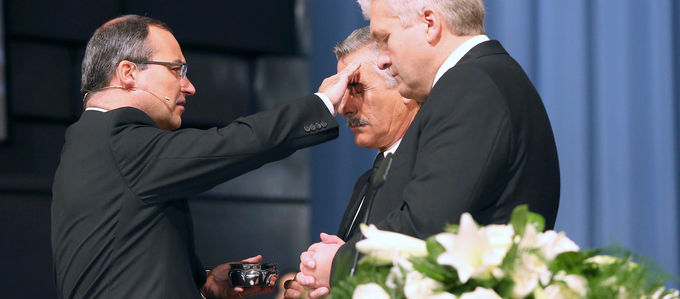
In all churches there are memorial ceremonies and services—defined to a greater or lesser extent—for loved ones who have passed away. Some Orthodox denominations celebrate with bread and cake at the grave. Other churches celebrate services of remembrance. The New Apostolic Church celebrates divine services for the departed three times each year.
“Divine services for the departed take place three times a year, on the first Sunday of March, July, and November, respectively.”—So reads the Catechism of the New Apostolic Church (CNAC 12.1.13). This describes a practice which only developed concretely over the course of church history, but was actually always in existence. Apostle Friedrich Wilhelm Schwartz (1815-1895) already acted in accordance with this practice. In the early travel reports of the Apostles, we often even find specific references as to how many were sealed, whether from among the living or the dead.
The current practice—namely to have three divine services for the departed each year—dates back to a ruling from the then Chief Apostle Johann Gottfried Bischoff in the year 1954. Accordingly, departed souls are to receive Holy Communion every Sunday through an Apostle, and three times each year, special divine services are to be conducted in which the sacraments can be dispensed to departed souls who long for salvation.
Early church tradition
The purpose of a divine service for the departed is to impart sacramental acts—at least in those places where the Chief Apostle or the District Apostles are conducting divine services. In all other congregations it is a service of remembrance.
The Catechism makes reference to an early church tradition: “Already in the congregation of Corinth, the living were baptized on behalf of the dead (Corinthians 15: 29). This practice is continued in divine services for the departed conducted by the Chief Apostle and the District Apostles: in them, two ministers receive Holy Baptism with water, Holy Sealing, and Holy Communion on behalf of the dead. The sacraments are performed in the same manner as usual. In the other congregations, the departed are then commemorated in a special prayer after the celebration of Holy Communion.”
God’s offer of salvation applies to all
Such divine services for the departed have an important place in the New Apostolic church year. The congregation is prepared for this special service on the Sunday preceding each. Compassion and empathy are to inspire intercessions on behalf of the departed. For example, the basis of the sermon for tomorrow is from Psalm 95:6: “Oh come, let us worship and bow down; let us kneel before the Lord our Maker.”
It was with these words that the praying congregation of that time was encouraged to worship God, who has created the world and who guides it in His sovereign power. Such an attitude is also necessary in view of the coming service for the departed. After all, people generally need to summon up a great deal of faith for things they cannot see or assess in a scientific manner. Despite our limitations, however, the will of God remains unchanged: salvation is offered to both living and dead alike.
The Apostle ministry is necessary
In the early post-apostolic period, the church began to distance itself from the practice of intercessory dispensation of sacraments to the dead, and ultimately prohibited baptisms for the dead in the year 397 at the Third Council of Carthage. From the New Apostolic perspective this is not surprising, because it was only the renewed personal occupation of the Apostle ministry in the 1830s that made a renaissance of this early Christian practice possible.
The New Apostolic Catechism emphasizes the Apostle ministry for the dispensation of the sacraments: “The Apostles fulfil the commission of Jesus—namely to proclaim the gospel, to forgive sins, and to administer the sacraments—upon both the living and the dead. They act in Christ’s stead and in His name. Just as Jesus Christ brought His sacrifice on earth, salvation is also imparted through the Apostles on earth. Since sacraments always have a visible component, they can also only be performed in the visible realm. The effect of the sacraments as essential elements in imparting salvation is the same for both the living and the dead” (CNAC 9.6.3).
Not Spiritism!
The dispensation of the sacraments in New Apostolic services for the departed must not be confused with Spiritism. The object is not to gain or procure insights into the beyond. It is not a matter of acquiring knowledge about the worlds in the beyond or the condition of the dead. By no means is the beyond to be incorporated into the here and now or made accessible to us. This practice is not intended to satisfy any sort of metaphysical curiosity. It simply expresses the promise of salvation which, according to the will of God, applies to the living and the dead equally.
Photo: Frank Schuldt




